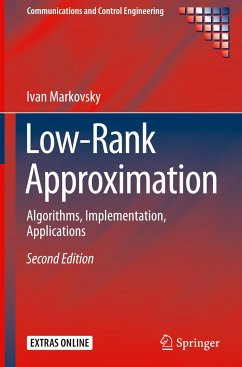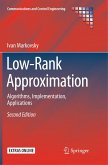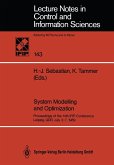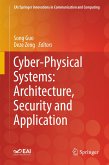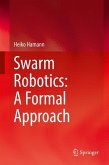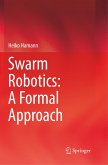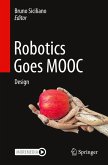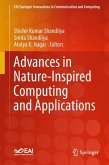This book is a comprehensive exposition of the theory, algorithms, and applications of structured low-rank approximation. Local optimization methods and effective suboptimal convex relaxations for Toeplitz, Hankel, and Sylvester structured problems are presented. A major part of the text is devoted to application of the theory with a range of applications from systems and control theory to psychometrics being described. Special knowledge of the application fields is not required.
The second edition of /Low-Rank Approximation/ is a thoroughly edited and extensively rewritten revision. It contains new chapters and sections that introduce the topics of:
-variable projection for structured low-rank approximation;-missing data estimation;-data-driven filtering and control;-stochastic model representation and identification;-identification of polynomial time-invariant systems; and-blind identification with deterministic input model.
The book is complemented by a software implementation of the methods presented, which makes the theory directly applicable in practice. In particular, all numerical examples in the book are included in demonstration files and can be reproduced by the reader. This gives hands-on experience with the theory and methods detailed. In addition, exercises and MATLAB^® /Octave examples will assist the reader quickly to assimilate the theory on a chapter-by-chapter basis.
"Each chapter is completed with a new section of exercises to which complete solutions are provided."
Low-Rank Approximation (second edition) is a broad survey of the Low-Rank Approximation theory and applications of its field which will be of direct interest to researchers in system identification, control and systems theory, numerical linear algebra and optimization. The supplementary problems and solutions render it suitable for use in teaching graduate courses in those subjects as well.
The second edition of /Low-Rank Approximation/ is a thoroughly edited and extensively rewritten revision. It contains new chapters and sections that introduce the topics of:
-variable projection for structured low-rank approximation;-missing data estimation;-data-driven filtering and control;-stochastic model representation and identification;-identification of polynomial time-invariant systems; and-blind identification with deterministic input model.
The book is complemented by a software implementation of the methods presented, which makes the theory directly applicable in practice. In particular, all numerical examples in the book are included in demonstration files and can be reproduced by the reader. This gives hands-on experience with the theory and methods detailed. In addition, exercises and MATLAB^® /Octave examples will assist the reader quickly to assimilate the theory on a chapter-by-chapter basis.
"Each chapter is completed with a new section of exercises to which complete solutions are provided."
Low-Rank Approximation (second edition) is a broad survey of the Low-Rank Approximation theory and applications of its field which will be of direct interest to researchers in system identification, control and systems theory, numerical linear algebra and optimization. The supplementary problems and solutions render it suitable for use in teaching graduate courses in those subjects as well.
"Exercises in each section and the corresponding solutions provided will help the reader to practice with the presented algorithms. There is a great deal of well-established approximation methods and algorithms in data science. This book may prepare the reader in finding the appropriate approaches for solving the particular problems of interest. It can be recommended to both Ph.D. researchers and experienced scientists working on processing and analysis of large complex data." (Boris N. Khoromskij, SIAM Review, Vol. 63 (4), December, 2021)
"Markovsky's book is certainly well suited for graduate students and more experienced readers, and should also be useful to people who need to apply LRA methods in their daily work." (Kai Diethelm, Computing Reviews, July 18, 2019)
"Markovsky's book is certainly well suited for graduate students and more experienced readers, and should also be useful to people who need to apply LRA methods in their daily work." (Kai Diethelm, Computing Reviews, July 18, 2019)

